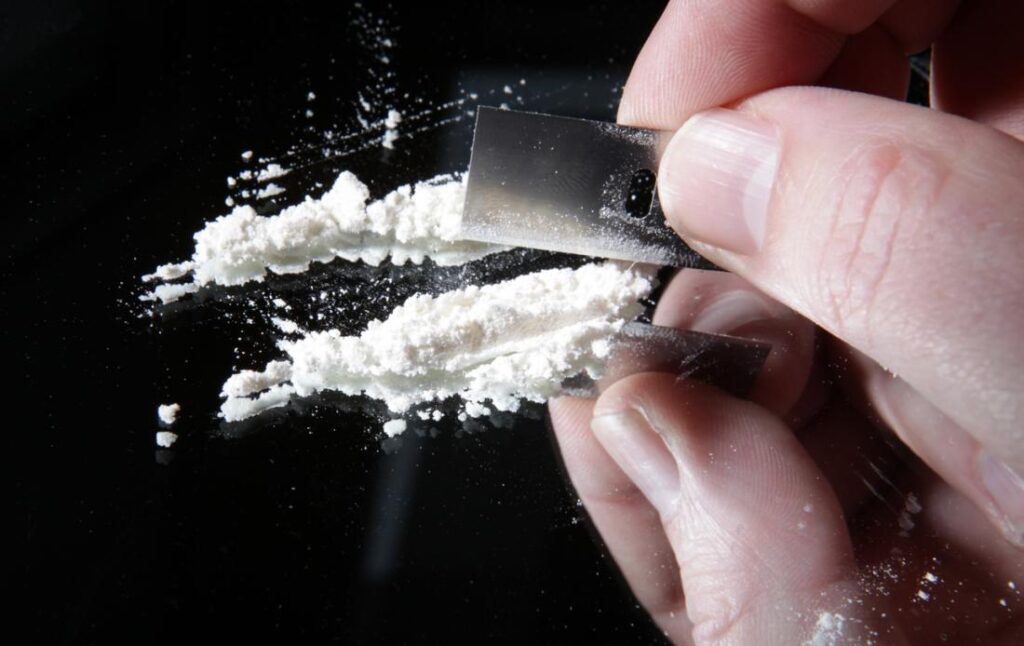Table of Contents
ToggleWhat are the Effects of Cocaine High and How Long Does Cocaine Stay in Your System?
Cocaine, AKA ‘Coke’ and ‘Charlie,’ is one of the most widely abused drugs in the US. It’s known to deliver intense highs, and users might feel excited, elated, more confident, and super alert. However, this feeling of euphoria is short-lived, and the effects fade away anywhere between 10-40 minutes, depending on the purity of the drug and the individual’s tolerance.
Now, if you are keen to understand how long the effects of cocaine last in the system, we’ve got it all covered in this post. Today, we’ll discuss the effects of cocaine and how long cocaine lasts in your system. We’ll also share treatment options for people struggling with cocaine and other substance use disorders – let’s dive in.
Effects of Cocaine

Cocaine is a powerful stimulant drug derived from the coca plant leaves native to South America. Cocaine is mostly used for its euphoric effects, and you would typically inject, smoke, or snort it, depending on the form. Once you use cocaine, it will increase the levels of dopamine in the brain, where you get the good feeling effect. Because of these euphoric effects, someone can be a chronic cocaine user and keep experiencing them.
The initial high from cocaine is fairly intense, there can be immediate effects on your mood, behavior, and physical health. For your mood and mind, you may experience signs of enhanced confidence, increased energy, impaired judgment, increased anxiety, and more. Some get hyperactive depending on the amount of cocaine intake.
Cocaine users may also experience high blood pressure and increased heart rate from using it. This is because cocaine will stimulate the nervous system, leading to increased blood pressure and heart rate. Even if this may last for a few minutes, it can lead to cardiovascular complications later with chronic cocaine use.
The overall health risks are that repeated use of cocaine can lead to addiction and dependence. We explore more in terms of the short-term and long-term effects of cocaine below.
Short-Term Effects of Cocaine
People would consider using cocaine simply because it leaves them with intense feelings of pleasure, boosted energy, and heightened alertness. However, these effects still come with adverse short-term effects of cocaine you should know about. Such effects usually include:
- Increased heart rate, which might lead to risks of heart attack or arrhythmias.
- Elevated blood pressure is quite common, which might increase the risk of a stroke
- When used in high doses, it is a disaster in waiting, as some people end up overdosing. Notable symptoms of an overdose include loss of consciousness, seizures, and severe anxiety
- Increased sociability, restlessness, and impulsiveness
- Anxiety and paranoia are additional short-term effects of cocaine
Long-Term Effects of Cocaine
Other than the short-term effects of cocaine mentioned above, you are likely to face serious side effects as you keep using cocaine for a long time. While effects may vary from person to person, below are some notable long-term effects you can expect:
- Addiction and dependence on cocaine are expected in the long term as you keep using the drug. This is where you have a chronic craving for cocaine.
- Users of chronic cocaine also start to experience cardiovascular issues such as heart damage, arrhythmias, and hypertension.
- Neurological impairments such as memory loss, brain damage, and mental health disorders
- Respiratory and other health problems, including lung and nasal damage
- Gastrointestinal complications, including malnutrition and ulcers or perforations
These long-term effects can be life-threatening, and hence, the reason you should seek professional help for addiction. Professional treatment, including detox programs, rehabilitation centers, counseling and therapy, and support groups, are just a few of the options you can use to quit your long-term cocaine use.
How Long Does Cocaine Last in Your System?

The question of how long the effects of cocaine last is best answered based on a number of factors. The frequency of use, the individual’s metabolism, and the amount of cocaine someone uses are some of the factors that determine how long cocaine stays in the system.
Cocaine generally has a shorter half-life, and its effects can wear off within two hours. However, what about the long-term side effects of cocaine use? These are mostly caused by cocaine metabolites such as benzoylecgonine, which linger in the body for longer.
Cocaine can be detected in the urine within three days after the last time you use it. This is the first time someone has used cocaine. However, for chronic users, cocaine can still be detected in urine for up to two weeks. Other methods for detecting cocaine in the system include blood tests, hair, sweat, and saliva tests.
How Long Does Cocaine Stay in Your Hair?
Cocaine is detectable in your hair follicles if you have been using it for extended periods. As you ingest cocaine, it is transported to the hair follicles once it enters the bloodstream. A hair sample can provide a record of use of cocaine for up to 90 days from the last time you used it, especially if you are a chronic cocaine user.
How Long Does Cocaine Stay in Your Saliva?
Side effects of snorting cocaine, such as hallucinations, can make your bosses know you are not in the right state to work. That is why a saliva drug test might be administered. In this case, cocaine can be detected in saliva within 24 to 48 hours of use. Being non-invasive and easy to use, it can be used as a quick drug test in most workplaces.
How Long Does Cocaine Stay in Your Urine?
Chronic cocaine use will lead to long-term effects of cocaine, which might make you incapable of handling your daily responsibilities. In this relation, a urine test can also be used to detect cocaine use. Urine tests are mostly used for detecting cocaine metabolites. They can be detected within 2 to 4 hours of use for single users. In some cases, they can be detected within 3 days. As for chronic users, they are still detectable for up to 2 weeks.
How Long Does Cocaine Stay in Your Blood?
Cocaine can be detected in the blood shortly after using it. The detection window in a blood test spans up to 12 hours for cocaine. It is up to 48 hours for cocaine metabolites such as benzoylecgonine. A blood test is often chosen because it is highly accurate and provides you with a precise measure of recent cocaine use by an individual.
What are the Dangers of Cocaine Abuse?
Cocaine addiction, cocaine overdose, and cocaine withdrawal all take a major toll on one’s physical and mental health. The risks are even higher when using cocaine with alcohol.
Cocaine use is likely to lead to cardiovascular complications, including high blood pressure, increased heart rate, stroke, and more. The vasoconstrictive properties of cocaine may also lead to reduced blood flow to vital organs of the body. This may lead to organ failure with chronic use of cocaine.
The biggest risk to this drug use is cocaine addiction. Keep in mind that it can stay in your system in the form of metabolites, which also affect how you function. That is why you might find yourself craving cocaine as you stop using it. That is how you end up with psychological dependence on cocaine.
The dependence is what then leads to addiction, which comes with multiple withdrawal symptoms. The symptoms include depression, increased appetite, and fatigue from when you stop using cocaine.
Cocaine use does not just affect you but also those around you. This is because you might end up with strained relationships, financial hardships, legal troubles, and more.
Cocaine Addiction – Warning Signs, Effects, and Withdrawal Symptoms

As we are aiming to discuss how long the effects of cocaine last, it is vital to also look at cocaine addiction, its warning signs, effects, and withdrawal symptoms.
Cocaine is a Schedule II substance, and its addiction can be both physical and psychological.
Psychologically, you will have a compulsive craving for cocaine as you continue to desire the effects of cocaine on the body. This includes the desire to experience intense euphoria and invincibility. Even when people see such negative effects of cocaine on the brain, people would still go for it.
Other common effects of cocaine include increased risky behavior, legal consequences, financial strain, skin problems, social isolation, and more.
The physical aspect of cocaine addiction is when you start experiencing the withdrawal symptoms of the drug whenever you stop using it. The symptoms can range from mild to severe, depending on cocaine use frequency. The symptoms can include some notable health problems like depression, unpleasant dreams, intense drug cravings, anxiety, fatigue, and increased appetite.
Seeking cocaine addiction treatment is important for managing the withdrawal symptoms while also overcoming the addiction. Medical professionals will provide you with a personalized treatment plan depending on your individual needs. If you can stick through the program, you may find that it is possible to deal with cocaine addiction and lead a healthy lifestyle.
Treatment for Cocaine Addiction
Once you’re addicted to cocaine, your journey to sobriety can’t be a cakewalk.
When you read about the effects of cocaine on the brain, they are scary enough to make you consider seeking treatment for cocaine addiction. Multiple methods can be used in treating cocaine use disorder. Such include detox, support groups, and therapy. In some cases, inpatient rehabilitation might be necessary to deal with your addiction better.
The inpatient treatment option at a rehab center is often recommended so that you have better control of cocaine addiction. Most rehabs can last 90 days or more, depending on the individual’s needs. The inpatient program may cover several things in the process of helping you recover from cocaine user disorder. Such include:
- Counseling
- Support groups
- Aftercare planning
- Dialectical behavioral therapy
- Cognitive behavioral therapy, etc.
There are multiple rehab centers in Orange County, California such as Harmony Junction Recovery you could consider. Most of these centers will have serene environments, all aimed at helping you overcome your addiction, so they are worth checking out.
Looking for Cocaine Addiction Treatment? Learn About Harmony Junction Recovery Cocaine Detox Program!
We believe now you are well aware of how long cocaine stays in your system, and you also know the downsides of being addicted to cocaine.
The effects of cocaine and alcohol on the heart, brain, and other organs can make you reconsider your lifestyle choices. If you are aiming to choose cocaine detox, contact the qualified team of Harmony Junction Recovery. Our Orange County rehab center is best known for a well-rounded cocaine detox program, where we focus on helping beat intense cocaine cravings and get rid of the addiction in a safe space. Get in touch with us to find the best treatment for your substance use disorder today!
Clint earned a Master of Science in Clinical Psychology in 2012. With 5 years in drug and alcohol treatment and 8 years in private practice, he specializes in helping clients uncover obstacles to living their envisioned life. Leveraging his experience, Clint supports clients in finding the motivation to make meaningful life changes.
Follow him on: Linkedin
Get support : Clint Website
